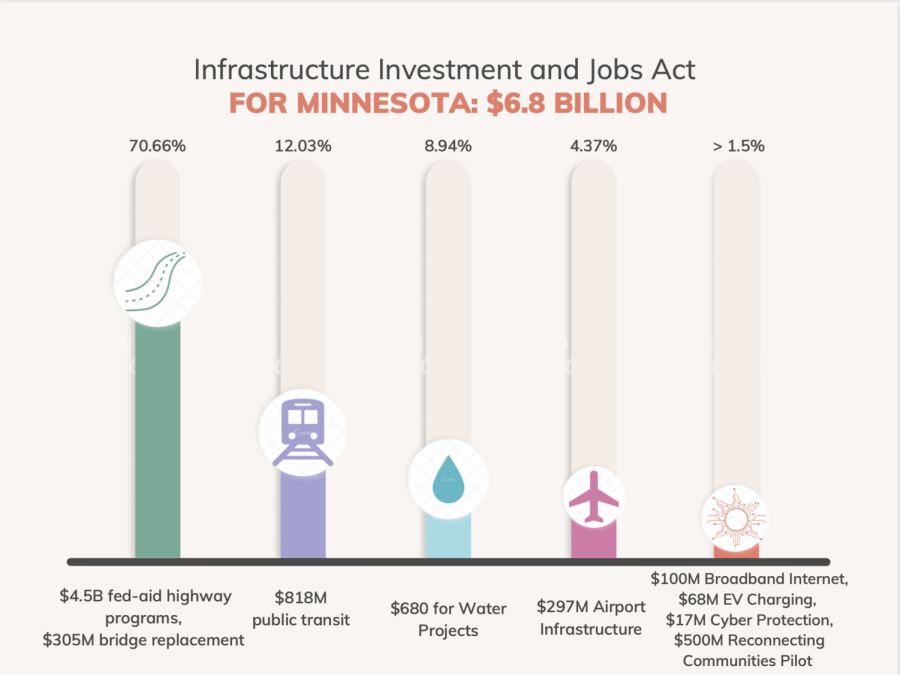Invest in equitable green infrastructure
February 17, 2022
On November 15th, 2021, the Biden administration signed into law the $1.2 trillion Infrastructure Investment and Jobs Act, more commonly known as the Bipartisan Infrastructure Law. This legislation represents a significant investment in the United States’ failing infrastructure. Roads, bridges, public transit, water pipes and more are being given much needed funding after decades of neglect. While the Bipartisan Infrastructure Law contains some climate-relevant provisions (mainly climate resilience, electric vehicle charging stations, and public transit), it falls far short of the necessary investments to reach carbon neutrality by 2050 and protect our most vulnerable communities. Much of the potential funding for climate-specific investments has stalled in the Build Back Better bill due to right-wing Democrats, but it is important to focus on the implications of the new law, as sparse as it may be on climate funding. Specifically, we want to highlight the importance of engaging in the upcoming process of funding allocation, particularly from a climate and environmental justice perspective.
Historically, what government agencies have called “development” has been done at the expense of BIPOC and low-income communities. In 1956, infrastructure spending executed by the Minnesota Department of Transportation for the construction of Interstate 94 resulted in the demolition and division of the thriving Rondo neighborhood, once home to 80% of St. Paul’s Black residents. Road construction in the U.S. also reinforced settler colonialism as a tool in continuous westward expansion, representing the colonial takeover of land and forced removal of Indigenous communities. To avoid reproducing harm and to ensure a positive investment into communities across Minnesota, the process of spending the infrastructure package must center community engagement, equity, and accountability.
Minnesota will be receiving nearly $7 billion, which can largely be split into six focuses: $4.5 billion for roads, $818 million for public transportation, $680 million for water infrastructure, $302 million for bridges, $100 million for broadband expansion and $68 million for electric vehicle infrastructure (see graph). The majority of investments in this bill are focused on traditional, high emitting modes of transportation, leaving much to be desired when it comes to climate provisions. But there is still great importance around how this money will be spent, and what programs and projects it ultimately funds. This is an opportunity to advocate for electrified transportation systems, reconnecting communities, expanded public transit and more. We also know that climate change is going to get much worse before it gets better, and we must improve the ability of our communities and their infrastructure to prepare for and recover from climate fueled disasters. The investments within this package must be allocated in a way that centers justice, equity and climate resiliency, and actively improves the lives of BIPOC and frontline community members. The state legislature must listen to communities and their demands, rather than telling them what they need.
One example of necessary community engagement and justice-oriented investments is the Rondo neighborhood. For years, members of the Rondo neighborhood have been advocating for the state to reconcile the unjust and outright racist urban planning that bisected their neighborhood and contributed to housing injustices in the Twin Cities. Their efforts, through the ReConnect Rondo Project, is a perfect example of important and equitable investments that can begin to address past racial grievances. As the legislature begins debate on how to distribute this money, we must uplift projects like ReConnect Rondo, and ensure they are being properly funded.
One large question that remains is whether or not Minnesota’s divided legislature can even find a way to effectively and equitably allocate all of the money granted. With Republicans controlling the Senate and Democrats controlling the House, negotiation and concessions will be inevitable. Less partisan issues including expanding broadband internet access in greater Minnesota and repairing roads and bridges across the state will likely have an easier time passing. On the other hand, issues like public transit, electric vehicle infrastructure, and climate resiliency, which Republicans often consider less pressing, may be left by the wayside. Thus, it will be crucial for Democratic legislators to be aggressive and push for all of the money to be used and to prioritize projects that reduce emissions and promote justice and equity.
Money from the infrastructure law must be allocated toward improving the conditions for BIPOC and frontline communities. To ensure proper allocation of this money, we must make our voices heard, and you can get involved in two key ways. First, contact your state legislators (contact information can be found on the Minnesota legislature’s website). If you live in Mac-Groveland or Union Park, that’s likely to be Sen. Erin Murphy (DFL) and either Rep. Kaohly Her (DFL) or Rep. Dave Pinto (DFL). If you’re unsure what to say, follow our Instagram @sunrise_twincities for a call script. And second, join our hub (link to join is on our Instagram as well). We currently meet every Sunday at 5 p.m. over Zoom and organize around climate and environmental justice issues. Join us as we fight for a livable, equitable future!













